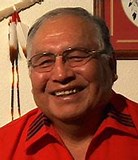|
Inspired by a Cheyenne story W/editing assistance by Wayne Leman TSESSOHPETANENĖSTOVE TSEXHOTOVANATO: hetsėtseahe LIVING THROUGH DIFFICULT TIMES: an analogy of today. Mo’aenevėhanehe. Mo’ȯseetonetȯhanehe. It was winter time. It was very cold. Hesta’se mohma’xėhovėsetsevanȯhehe. Snow was piled everywhere. Kȧhamaxėstse tseohkėho’ėšeme moma’seohtsehanehe. Camp firewood was being used up. He’nostonėšemȧhanevȯse moxheomėsėhaahpe’eenoo'ehanehe. No one could go after firewood because the snow was too deep. He’nostonėšenȧho’ȯhtsevȧhtsevȯhtse. They could not even visit each other. Hestamevo mohno’easema’seohtsehanetsehe Their food was dwindling. Menȯhtse naa honovohko mo’asemȧheestȧhenovohe. Berries and dried meat were being depleted. He’nostonėšeeve’tomo’evȯhtse. It was difficult to go to another teepee to get some food. Heseeotȯtse, hetanevano’ėstse, šeštoto’e mo’asema’seohtsehanevotse. Medicinal herbs, man sage, cedar and other healing plants were vanishing also. He’nostonėševestȧhemovȯse tsehaomohtȧhetsese. It was difficult to heal those who were sick. Otaxa mohxaehe’kėto’omoehevohe heveenotsevotse The only thing people could do was to stay in their teepees. Kȧsovaaheho naa hetaneo’o tseešėhaa’ehahese mohtaohkėheemȯhenėhevohe, hovahno he’nohkeme’ovovȯse; otaxa mo’ȯhkeevȧho’ėho’ȯhtsevo. Young boys and older men went hunting, they could not find any animals; they came back empty-handed. “Nahko’e, neseemȧhehaeanama, natao'sėhenȯhtsevoomoo’e hotovao’o naa heva vaotsevahno,” heške moxhetȯhevohe. “Mother, we are all so hungry. I’m going to look for buffalo or deer,” he told his mother. Mo’exovee’ėsanėhehe. “O’haetanoo’e” heške moxhetaehevohe. Mȧhtohto hohtȧhnaesohto aenamėhehe mohnėhestȯheaenamȧhehe. He dressed warmly. “Be very careful,” his mother said. He was only 16 years old. Nešee'ėše mo’eohtsėhehe. Moxho’oxeohtaanėhehe tohtoo’e. Naohkeva’neaestomenestovoo’e Esevone moxhešėtanȯhehe. He wandered for two days. He decided to stay out one more night. He thought he could hear the rumbling of buffalo somewhere. Tsehtšėšeepėhevevoo’ȯhtse na’ėstse hotova’e moso’hovenehoveoeotsėhehe. Mohma’xeoeveohtsėhehe. Nėseehaesto esevone moso’hovenehoveoehevohe. Once he was settled and warm, he prayed to Ma’heo’o, asking for guidance for himself and food for his people. Then, finished, he looked around. There a distance from him, a buffalo suddenly stood up and shook the snow off. Soon, there were many buffalo standing up, shaking off the snow, and beginning to graze as only buffalo knew how. Mohva’neahto’heenȧhevohe. They had just been buried in the deep snow. Nehe hetaneka’ėškone mostaevėhenėhetȯhevohe hevo’ėstanemo. That young boy went to tell his people what he had seen and where. Tse’ešeevama’seanehnevȯse naa tse’ešeevamȧhena’so’enȯhevȯhtse mo’oesevehohevohe nehe hetaneka’ėškone. Hotovao’ȯhme’ovȯhtse. When the meat was butchered and all were fed, a name was ceremoniously given to the young boy: The one who finds the buffalo.  Dr. Richard E. Littlebear is President and Interim Dean of Cultural Affairs at Chief Dull Knife College located on the Northern Cheyenne Reservation in Montana. He actively promotes bilingualism, advocating for bilingual education on a local, state, national and international level. He encourages the continued oral, written and reading usage of the Cheyenne language specifically, and of all indigenous languages generally. He considers learning to read and write the Cheyenne language -- his first language -- as his greatest academic achievement.
1 Comment
Karen Pringle Cunningham
7/23/2022 05:58:30 am
Wonderful poem. I attempted to pronounce the Cheyenne words while I read the English. I wish I could hear Dr. Little Bear read it.
Reply
Leave a Reply. |
Now more than everThese poems have been submitted to the call for poetry "Now more than ever" Archives
October 2021
Poets
All
|
 RSS Feed
RSS Feed